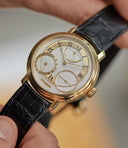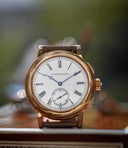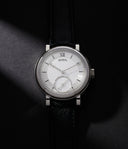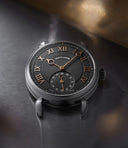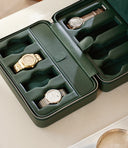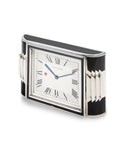
Are There Bubbles in the Watch Market?
By A Collected Man
“A bubble is created by irrational expectations of a market fuelled by speculation and greed,” states industry veteran, Olivier Müller. This is by any measure, a sensitive topic. Whenever we talk about the rise and fall of values, we are ultimately dealing with a matter that can generate strong feelings, as value is so often subjective. Those who are invested in certain corners of the market, whether for passion, profit or both, are always going to have something to say when it comes to the perception of mysterious bubbles forming, and if, or when, they might burst.
However, taking a pragmatic view of these things can be particularly useful. Studying the various times that collectors have labelled certain fluctuations as bubbles, helps us to understand when they were right, or when they may have been a little hasty in their doomsday calls. As we will discover, it can be almost impossible to correctly spot a bubble every time, although there are certain signs of which to be wary.
After breaking down what a bubble really is, we’ll look more closely at a few examples which can help inform our understanding of watch markets. Specifically, we will examine trends around vintage Heuer, Panerai and Rolex Bubbleback pieces, to see what parallels can be drawn and insights gained. By no means are we insinuating that all three of these were bubbles, but we intend to gain a better understanding of how they evolved and what caused them to behave the way they did.
What is a Bubble?
By any financial definition, it is almost impossible to correctly identify and label a financial bubble before it pops. We spoke with @NYCWatchGuy, a collector and venture capitalist, about this very issue and he put it bluntly, “anyone who says they can spot a bubble is either Nostradamus or simply a speculator themselves. You only know something was a bubble if and when the bubble bursts, and everything in hindsight is 20-20.”

A tricky concept to grasp, and an even harder one to identify properly.
For a clearer idea of what a bubble actually is, he also gave us a working definition. “In simplest terms, a financial bubble refers to a time when the price of any asset exceeds any rational or fundamental value, and where even if you look to the future, it is hard to believe that the asset can realistically catch up to the current price.” This is echoed by Oliver Müller, founder of LuxeConsult, who points out that, “a market bubble is created by speculation, fuelled by people expecting the prices to grow forever.”
This often occurs over time, through an incremental process. “Most of the time you have a rational element – let’s say in our case the scarcity of a specific Rolex watch – that drives prices up first for this reference,” Müller points out. “The bubble starts when people speculate and expect the return on investment to grow beyond reasonable growth rates. This is the irrational moment, when people start buying even though the prices of the secondary market are already twice, or three times the normal retail price.”
Beyond the speculation of individuals, there are other forces which can artificially fuel the market. Although none of the brands would openly admit it, Müller is keen to point out that auction marketing plays an important role. “Any brand wanting to push its image and desirability uses the hype built around auctions and to manipulate – directly or indirectly – the secondary market. The first to do that in a smart way were Patek Philippe and Breguet, with their respective owners buying a lot of historical pieces, and thus quickly pushing up the prices.” This can help inflate bubbles that are already forming on the open market, as some of the best examples are publicly bought by brands, who take them out of circulation for good and place them in their archives or museum.
However, when trying to understand bubbles, comparing the watch world to traditional financial markets has certain pitfalls. The two are not entirely alike, so conclusions shouldn’t be drawn too hastily. As NYC Watch Guy is keen to remind us, “the watch world is even more irrational than the public markets, as there is emotion attached to our assets in a way that simply does not exist with stocks and bonds.”
Building on this, he provided the following analogy. “Let's say you're a watch collector. You bought a Patek 5711 at $100,000 this year and in two years for some reason this bubble does burst, and the watch goes down to $65,000. You did the same thing with Apple stock. You bought $100,000 worth and now it's worth $65,000. Which one are you more likely to sell? I'd argue that the Apple stock provides zero utility to me, whereas the watch provides me with some level of joy, and so if my belief is that neither of these assets is going to recover, I'd sell the Apple stock, which would cause the value of Apple stock to plummet even further – obviously I'm assuming that everyone is acting in the same manner as me – whereas I would hold on to the 5711 since I can technically still get $100,000 worth of value out of it, on my wrist.”


From the NYC Watch Guy’s perspective, there is more of a reason to keep a watch that’s depreciating than a stock doing the same.
This hypothetical scenario goes to show the multi-layered nature of the watch world. Yes, this is ultimately a space where offer meets demand, in a way which can sometimes be comparable to traditional financial markets. However, these do remain objects that bring together passion, emotion, and daily enjoyment. This personal element can cause individuals to think and behave in unexpected ways. Defining a bubble in this space is also further complicated by some of the other elements which can influence the price of a given watch. Provenance, condition, or even what other lot it’s being sold next to at auction, can all cause the value of a piece to go up or down. This doesn’t mean that bubbles can’t take shape, it just makes them that much harder to identify, before they’ve burst.
Vintage Heuer
This might be one of the first examples that comes to mind when bubbles are mentioned. On the surface, the vintage Heuer boom was driven by collectors’ desire to find the next rapidly expanding marketplace to sink their teeth into. Following the sharp rise in interest for vintage tool watches made by Rolex, they appeared to turn towards Heuer, due to the similarities in period, style, and story. Around 2016 and 2017, the market prices for key vintage models began soaring at an impressive rate.

A vintage Heuer Autavia Siffert.
In reaction to this, quite a few media outlets started to make a lot of noise about how vintage Heuer might be the “next big thing.” Often, they drew loose comparisons to the dynamic market for vintage Rolex Daytona chronographs, which were already considered highly desirable at the time. Some have pointed out that core collectors found themselves priced-out of a space they had traditionally dominated, with speculators and frenzied bidders taking their place. Eventually, this meteoric rise came to a halt, with prices for some of the key models dipping below auction records, and a significant number of newly acquired collectors leaving the marketplace.
However, some argue that this narrative doesn’t quite paint the whole picture. Richard Crosthwaite was at the very centre of the Heuer market, for decades prior to this more recent wave of enthusiasm. He saw its evolution from a niche, isolated corner of the community to it being thrown into the middle of hysteria. If you suggested this was a bubble, he would disagree. “Perhaps at most there was a moment of over-exuberance,” he told us, but “I don't think you could describe the Heuer market that I have been involved in over the past 13 years as a bubble at all.”


Comparing these two on the open market today would be like comparing apples and oranges, courtesy of Christie’s.
At the market’s peak between the summers of 2016 and 2017, a few records stand out. You had the sale of an Indy 3646 Autavia for $199,500 at Christie’s or a dealer achieving over $220,000 for what Crosthwaite describes as an “exceptional” all lume 2446 Autavia. These sorts of prices had never been seen before for pieces such as these. While steel sports watches, especially chronographs, had certainly been on the rise, the idea that a humble Heuer could reach such heights fanned the flames that led, in the final one to two years, to speculators joining the fray. This culminated in a moment where “arguably Heuer values were only second to Rolex in the sports chronograph arena,” says Crosthwaite.
As these headline pieces grabbed the attention of the media, it also helped to drive the only thing increasing more quickly than Heuer prices at this time, and that was chatter on Instagram. It is clear to anyone with a passing interest in the second-hand watch market, that greater exposure on Instagram can cause the prices of many things to surge. If you take this into consideration, you can see how it would start to attract those who would never have considered these racing chronographs previously.
Prior to all the noise, this market was made up of those knowledgeable, passionate collectors, who were buying these watches to accumulate significant collections that brought them joy. Increasing values were not a primary concern for them. However, it didn’t take long for this core group to get priced-out of the market which they had helped create. Crosthwaite tells us that back in about 2008, a 2446 Autavia 1st execution would only cost between £5,000 and £10,000 depending on the condition and version. The best examples can now trade between £50,000 for a steel hand and perhaps £75,000 for the all lume hand version. A sharp increase in price, by any measure. However, when you compare the price of the previously mentioned Indy 3646 with today’s prices, even Crosthwaite admits that the “very best” would only gain a valuation of about £75,000.
Unlike the other examples that we are going to look at here, there is one event that many point to as the moment the Heuer bubble, if it was one, popped. This was the Heuer Parade auction that took place in Geneva on November 17th, 2017. This thematic sale was made up of select Heuer chronographs from Crosthwaite’s collection and another collector, Paul Gavin. It was a highly anticipated auction, thanks to all the excitement that had surrounded the brand and its pieces up until this point. With so much built-up exhilaration and the promise of some of the best pieces from two of the top vintage Heuer collectors coming for sale, there was a lot riding on the event. Sadly, it never lived up to the expectations of some collectors. Though a few very decent results were achieved, many pieces fell short of the predictions made by commentators, who were hoping for a wave of record prices and strong benchmarks for the continued, exponential growth of the market.

An early example of a vintage Autavia 3646.
After this sale, the vintage Heuer market noticeably cooled down , as excitement turned to new horizons, such as the nascent interest in vintage Royal Oak and Nautilus watches. There were no more record-breaking auctions results or frenzied price increases, as prices stabilised, often dipping well below their previous heights. Whilst some may have called this a bubble, others perceive the increased interest in Heuer as entirely legitimate and valid, with the perception being spoiled by over exuberance towards the end. Regardless, the collecting community continues today, and whilst it does attract new collectors, it perhaps doesn’t sit in the mainstream in the way vintage Rolex does, for example. Since COVID, like most collectables, the best vintage Heuers have increased in value to the point where they are not dissimilar to the year of the peak (minus the two outliers). Bubble or not, the vintage Heuer market has been the topic of a fair few conversations and will likely continue to be for the foreseeable future.
Panerai
Panerai has always been a somewhat divisive brand among collectors. With a dedicated following – the Paneristi – and limited wider appeal, the demand for these pieces has always behaved in a singular way. However, this doesn’t mean that it’s been immune from the pressures and patterns that we see across the industry. There is arguably no one that has followed this market more closely than Jose Pereztroika. Founder of the website Perezcope, he has built up a reputation for his no-holds-barred approach to reporting on the industry and for pointing out inconsistencies whenever he sees them. We spoke with Pereztroika to get his insight on how the vintage Panerai market seems to have gone from boom to bust, in a very short period, and whether he perceives it as a bubble.

A rare manual winding Panerai Radiomir Type D 3646.
“Yes, there has been a bubble in the Panerai market,” he tells us, unambiguously. “It was artificially built up around 2012, 2013 and 2014, when it was as its highest.” He pointed to the sale of a supposed Italian Admiral’s ref. 6351-1 at Sotheby’s in 2014 for $425,000 as an unsustainable high point, or as he described it, “insane”. No Panerai has reached such heights on the open market since. According to Pereztroika, these results were inflated by two intertwined forces. Firstly, once natural momentum built-up around these pieces, the market quickly attracted speculators, as the press covered the various record sales and comparisons to Rolex were quickly made.
Secondly, the brand itself, subsequently acquired by the Richemont group, was also attempting to increase its awareness and respect. It’s worth mentioning that they did not employ the auction marketing method mentioned by Müller above, where they would bid on their watches at auction. Rather, they used their unique position to release a series of limited editions, to hype up certain areas of the secondary market. They thought that this would, in turn, increase the desirability of their current offering, creating a virtuous circle, where vintage and modern continually reinforce one another. As Pereztroika points out, “when they released the first Bronzo they said, ‘this will be the only Bronzo’ and then the next year they bring out another one!” This eventually led collectors to lose trust in the brand and contributed to prices tumbling and the bubble bursting.

The Italian Admiral’s ref. 6351-1 that reached $425,000, courtesy of Sotheby’s.
One major flaw of the Panerai market, which plagues the entire vintage world, yet seems to be particularly acute here, is that of supposed “Franken-watches”. These are pieces that have been put-together from old components and manufactured parts to form something that resembles a model of far greater value. There is a part of this community who openly talk about creating these watches, for no malicious reason other than the joy of making something with some connection to historical Panerai. However, once these make it onto the open market, under the guise of a genuine timepiece, they can cause havoc. After all, any trade is based on trust. If that fundamental element is no longer there, the whole thing tumbles.
Having gathered information on hundreds of different Panerai watches, Pereztroika has been able to identify countless instances in which watches were cobbled together from disparate parts. Looking at auction records, he noticed how certain watches changed appearance from one auction to the next, with dials, hands and cases being swapped between pieces, to create mythical collectors’ watches that would command serious prices on the open market. This was partially fuelled by the greed of certain unscrupulous individuals, who saw an opportunity for profit.

This Radiomir was removed from an auction at Antiquorum back in 2018, courtesy of Perezcope.
However, many of these rather explosive revelations came after the downward trend on the overall market had already begun, Pereztroika argues. It was the influx of special editions from the brand, along with their inconsistency, which led to a major dilution of the Panerai’s image on the primary and secondary markets. According to him, the link between the two cannot be denied. This was paired with the sudden increase in interest in other vintage sports watches, as the focus of often fickle collectors naturally shifted onto the next thing. This was paired with a return to more modestly sized watches, such that Panerai’s oversized designs didn’t necessarily have longevity. The bubble had popped.

Panerai have leveraged their heritage for a long time, through their marketing and limited editions.
Pereztroika was keen to point out that though the market has dipped significantly lower than its historic highs, it certainly hasn’t stayed down for good. Going on his data, it has actually grown since last November. This suggests that there might still be value in these models, when they are proved to be fully correct. That being said, it is unlikely that we’ll see the prices of Panerai pieces restored to their former heights.
Rolex Bubblebacks
Made between 1933 and 1955, the Rolex Bubbleback became one of the earliest, collectable categories of wristwatches – long before the Daytona or the Submariner. Thanks to its varied configurations of dials and case metals, it captured the imagination of enthusiasts. One of Rolex’s first self-winding, waterproof watches, a well-preserved Bubbleback in its original state is not easy to come by, given the age of most of these pieces and that poor restorations are rife.

Three Bubblebacks sold at Dr. Crott Auctioneers back in 1988, courtesy of Arthur Pfister.
As we covered previously in our article on Japanese watch collectors, the popularity of the Bubblebacks spiked during the 1980s, in part thanks to this market. This influence caught on, and the Bubbleback bug bit the rest of the world – one only has to watch Jason Singer’s interview with Talking Watches to see the variety and intensity that is involved in collecting these. This was one of the first true collecting obsessions, before anyone cared about the Paul Newman Daytona or any Nautilus. However, though it retains a dedicated following, the wider interest surrounding the Rolex Bubbleback has deflated – perhaps more like the slow descent of a hot air balloon, than a violent burst.
Over the last 40 years, while the Rolex brand has increased in stature, the same cannot be said for the Bubbleback. As Professor Brendan Cunningham notes in an article for Rescapement, there has been a significant loss of value in these pieces, between 2000 to 2021. “In May and November 2000, Christie’s sold five examples of the Rolex Oyster Professional Reference 3065 with an average price of $16,000. In contrast, examples of this reference selling at major auction houses – Antiquorum and Christie’s, in particular – over the past year had an average price of $13,200. This implies a loss of approximately 18% over 20 years, or roughly a 1% loss per year.” When this is put in comparison to the rest of the watch market, and especially that of other sports models from Rolex, this decline appears far more dramatic.
The reference 3065 is not the only one to have dropped in value over the past two decades. This can be extrapolated to other models within the Bubbleback collection, such as the reference 3131. This model holds a certain historical significance, as it is one of the earliest iterations of that iconic design. However, in auctions across Sotheby’s, Christie’s, and Phillips over the past ten years, barring particularly standout pieces, prices tend to hover between $3,000 to $5,000, depending on condition, rarity, and other usual considerations.
Meanwhile, the average price of a reference 3131 between the years of 2000 to 2010 could be anywhere between $3,000 to $7,000, trending towards the $5,000 to $7,000 range, rather than the lower end of the scale. At a time when auction results are routinely being broken and collectors’ focus on unique pieces only continue to drive prices upwards, this disparity does suggest that over the years, interest has begun to wane.

A vintage Rolex Bubbleback ad showing their official name, Rolex Oyster Perpetual, courtesy of Perezcope.
While hype and desirability certainly played a significant part in creating this bubble, one of the key reasons why the Rolex Bubbleback interest softened, is that interest began to shift from dress watches to steel sports watches, in the early 2000s. The Bubbleback was soon eclipsed by Rolex sports models like the Daytona or the Submariner, which were larger, versatile, and more suited to a contemporary lifestyle. It would be fair – and perhaps more accurate to say – that the collective interest in the Bubbleback gradually declined, rather than halted to a stop. This market also doesn’t appear to have been plagued with irrational behaviour or speculation, such that it might be unfair to label it as a bubble, though many have described it as such.
Parting Thoughts
It’s clear that tracking, analysing, and understanding watch markets can be a complex task at the best of times. With more media attention befalling the watch world – even Yahoo Finance are reporting on Rolex these days – it can be easy to assume that headline lots are representative of an entire category of pieces. Following these alone can often lead collectors to bemoan a bubble when, as we’ve discovered, they can be particularly difficult to predict. The first ones to label certain corners as a bubble often appear to be those hoping it will be, as they find themselves priced-out of a market they once actively participated in.
One thing we can be sure of, is that various markets will continue to develop, expand, and even soften, as tastes evolve, and attentions refocus. In fact, the pace of change might even accelerate, as information and awareness about certain pieces spreads much more rapidly than it did in the past. This might create bubbles in certain corners, forcing us to always consider whether the fundamentals of a market are strong, or whether they are behaving irrationally.
Our thanks to Oliver Müller, @NYCWatchGuy, Richard Crosthwaite, Paul Gavin and Jose Pereztroika for providing us with their insight into these ever-changing markets.




























































































